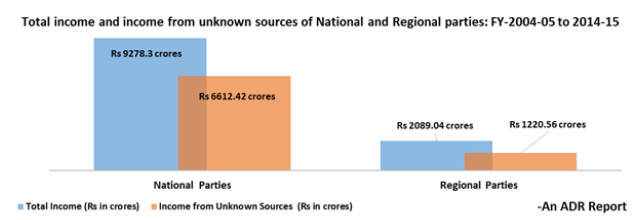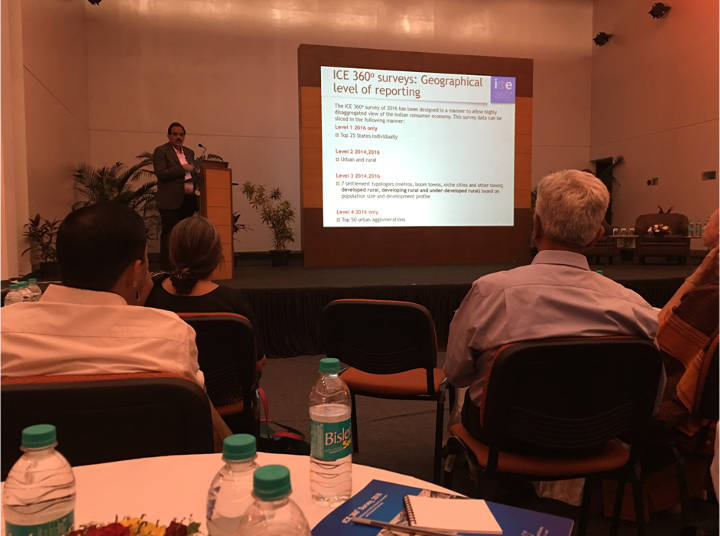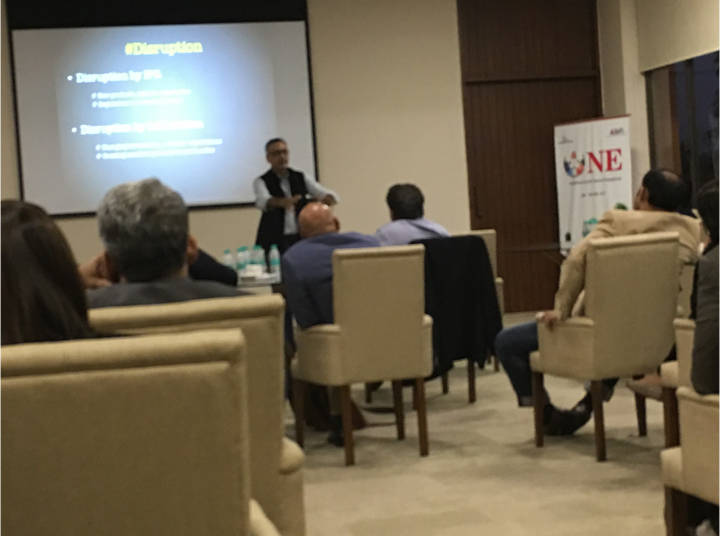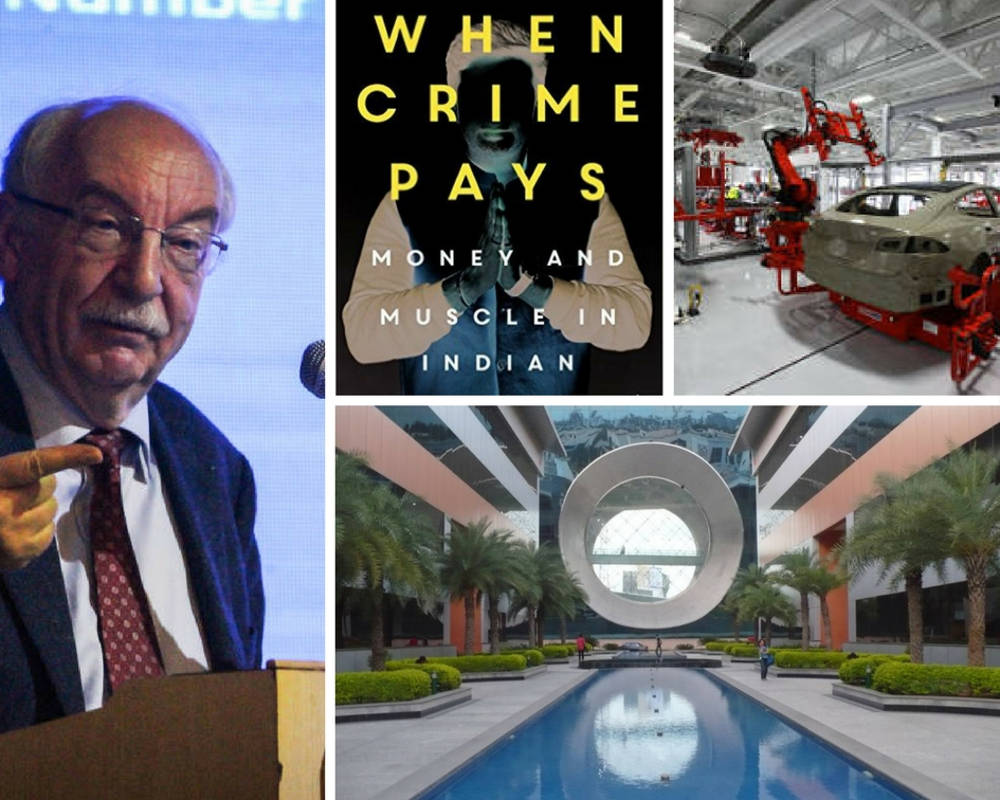Dear Friends,
How did your week go?
I spent a good part of my time last week following the political turmoil in Tamil Nadu, the clash between the founders and the board at Infosys, and writing and rewriting a story on a German psychologist I met recently.
First, politics. Till it was banned some years back, tall cutouts of political figures defined the skyline of Chennai. Those cutouts are now gone, but it wouldn’t take more than a few days in the city to get a sense of the big role personalities play in the politics of the state. So, after J Jayalalithaa, who dominated the political scene in the state since 1991, passed away in December there was much speculation on what would happen to the very nature of politics. If the events of the last few days are anything to go by, there is nothing to feel proud about. The more things change, the more they stay the same.
So, when my colleague Charles Assisi shared a note on a book launch he attended recently, it struck me that it’s not just Tamil Nadu we should be worried about. The problem is more deep rooted.
Here’s what Charles wrote.
Crime and corruption
Last week, some of us from Founding Fuel felt compelled to walk into a packed auditorium at the Nehru Centre in South Mumbai to listen in to a very interesting, albeit dark talk by Milan Vaishnav. It accompanied the launch of his book When Crime Pays. This is the outcome of Vaishnav’s meticulous research after travelling across the country and an attempt to answer why do Indian voters back politicians with criminal reputations.
I use the word “dark” deliberately because Vaishnav did not sound very optimistic about what India is staring at. To put things into perspective, he placed facts and statistics on the table—they don’t make for pretty reading.
Consider this for instance, from the Association of Democratic Reforms, the source for a lot of Vaishnav’s data. At present, political parties are not required to reveal the names of individuals or organizations giving less than Rs 20,000. As a result, over two-thirds of the funds cannot be traced and are from unknown sources. The outcome of which, when Vaishnav looked at the data, is this unfortunate figure.

Or a seemingly comical candidate like this:

This man is Anant Kumar Singh. Currently in jail, he has 16 cases pending against him. But his spouse is contesting as a proxy for him. He doesn’t see himself as a criminal though. Instead, in his eyes, he is a Robin hood of sorts modelled along characters from Hindi films like the corrupt cop with a golden heart as etched by some of these characters.

To that extent, the relationship between the voter and the candidate is a symbiotic one, Vaishnav argues.
The clash of the titans
To be honest, following the Infosys story was a relief. All the three key players are hugely respected—NR Narayana Murthy, R Seshasayee and Vishal Sikka. The issue at stake, at least to me from whatever I know today, seemed more to do with culture, rather than ethics or values. As Indrajit Gupta writes in his column, “Now, the founders perhaps forget that Infosys is no longer a Bengaluru based company. It is a global company, it works with clients around the world, has overseas employees on its payroll, including a foreign listing—and therefore, needs to become more global in the way it does business.”
At the height of all these, Vishal Sikka gave a presentation at the Kotak's Chasing Growth Conference in Mumbai. I thought it was a fascinating presentation, for not only throwing some light on the strategy that Sikka designed for Infosys since he took over as its CEO over two years back, but also on the big changes that are coming upon India’s IT services industry in the years to come. You can listen to the webcast here.
Indrajit Gupta also had the opportunity to attend two separate events, addressed by two people closely associated with Founding Fuel. Here are two snippets from those events that you might find interesting.
On February 15, well-known market strategist Rama Bijapurkar (she sits on Founding Fuel's Advisory Council) hosted an interesting seminar on The Realities of Consumer India: Recalibrating our Assumptions, based on a huge household survey done by a think tank People's Research on India's Consumer Economy (PRICE), that she set up with Dr Rajesh Sharma.
The multi-dimensional survey that casts the light on how India saves, earns, lives and spends, was revealing in more ways than one. A few gems: 77% of the bottom quartile own a mobile phone, yet only 18% have access to tap water. Nine out of ten people with access to internet in underdeveloped rural areas don't use it for banking or shopping. More here: http://ice360.in/uploads/files/about-ice360survey2016-09december2016-web.pdf
A panel discussion involving Arun Adhikari, former chairman of Unilever Japan and Dr Yuwa Hedrick Wong, chief economist at MasterCard Centre for Inclusive Growth later made sense of the implications for business strategy and public policy.

On Thursday, Haresh Chawla, Founding Fuel's ace contributor and partner at private equity firm True North addressed a top leadership team from ILFS at Kautilya, a unique leadership centre set up by K Ramkumar in Khalapur, off the Mumbai-Pune Expressway. Building on some of his thought leadership essays in Founding Fuel, Chawla made a series of insightful and provocative points on how digital disruption was changing the nature of the firm, why data rich wasn't the same as a data driven business and why relevance and repeatability need to be viewed as two separate roles inside firms.

The power of simple rules
Amidst all these, if there is one theme I was totally obsessed about, it was around the fascinating work led by German psychologist Gerd Gigerenzer. I met him and his team mates when he was in India earlier this year, and it was only last week that I sat down to write all that I learned from listening to them. I won’t say much about the story, except this: If you have read Daniel Kahneman’s Thinking, Fast and Slow, or Richard Thaler’s Nudge and if you totally agreed with what they say, you should definitely look up Gigerenzer. You might change your mind.
NS Ramnath
On behalf of Team Founding Fuel
Featured Stories
Gigerenzer’s simple rules
Why simple rules of thumb often outperform complex models. (By NS Ramnath. Read Time: 16 mins)
“When you are dealing with risk, complex mathematical models and fine tuning them for optimisation work. However, when you are dealing with uncertainty, they don’t work well, because the world is dynamic. What you then need is a set of simple rules of thumb that are robust and gut instincts sharpened by years of experience.”
Behind the Infosys brouhaha
Clearly, the founders at Infosys have a right to be heard. But they may have raked up needless controversy, in a desperate bid to belittle the board and the CEO. (By Indrajit Gupta. Read Time: 4 mins)
How to create your product differentiation strategy
How today’s companies can stand out in a competitive marketplace, differentiate their products and build a high-value company. The second article in a five-part series (By CKGSB Knowledge. Read Time: 4 mins)
What We Are Reading
Adopting an ecosystem view of business technology
By Driek Desmet, Niels Maerkedahl, and Parker Shi
McKinsey
The 2 mental shifts highly successful people make
Benjamin Hardy
Medium
How technology hijacks people’s minds—from a magician and Google’s design ethicist
Tristan Harris
Medium
The robot that takes your job should pay taxes, says Bill Gates
Quartz
From Our Archives
AlphaGo vs. Lee Se-dol: Why a win for AI is not a lose for humanity
When machines beat men, they make us seriously think about our place in a technologically advanced world and we tend to overestimate machines and underestimate men. By N S Ramnath (Read Time: 7 minutes) Read now
Fixing India’s jobs machine
Employment patterns are changing due to technology, emergence of new forms of enterprises, demand for social security, need for new skills, and the way enterprises are regulated says Arun Maira (Read Time: 4 minutes) Read Now
The future of manufacturing—and what it means for Make in India
Technological progress is changing the nature of work in ways we don’t realize. For India’s push into manufacturing to be successful, we need to prepare for manufacturing as it will be five years from now says Rishikesha T Krishnan (Read Time: 4 minutes) Read Now

